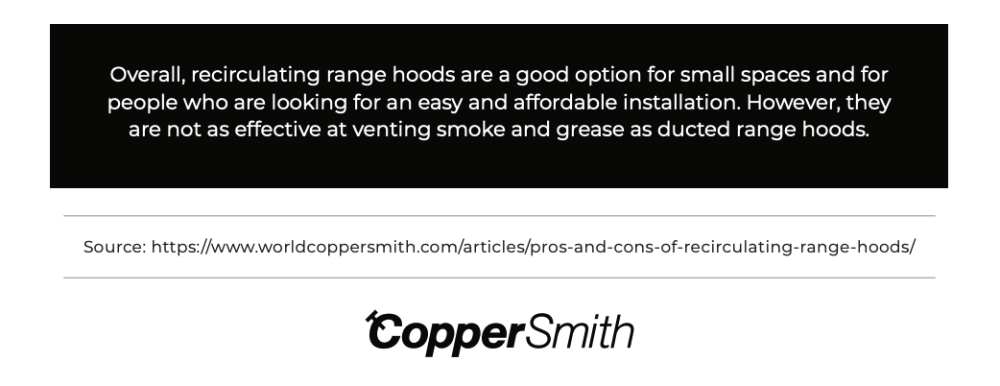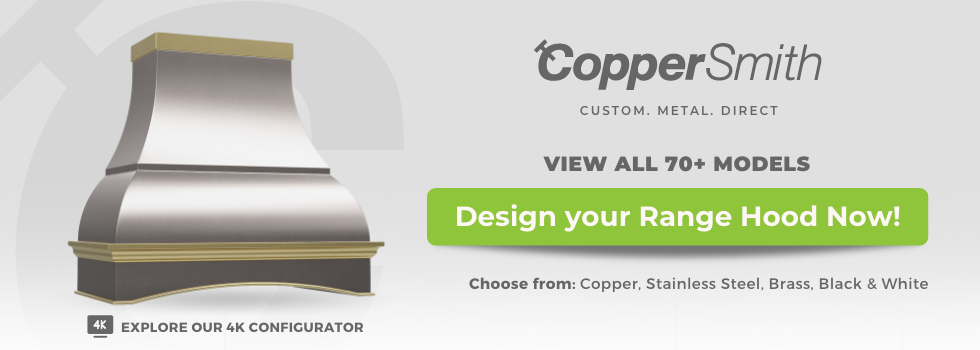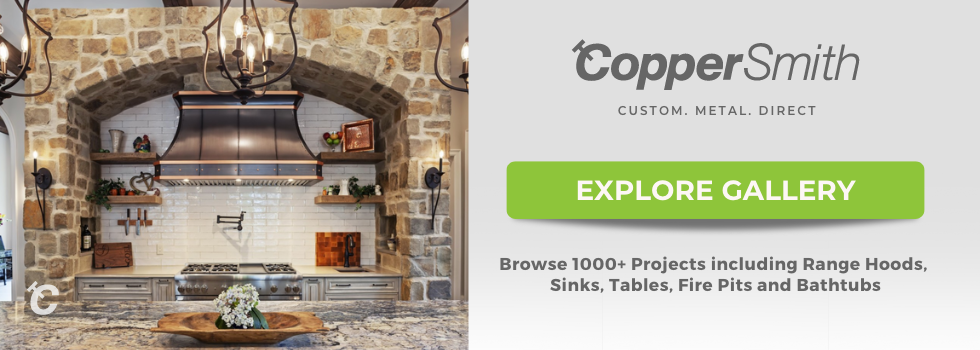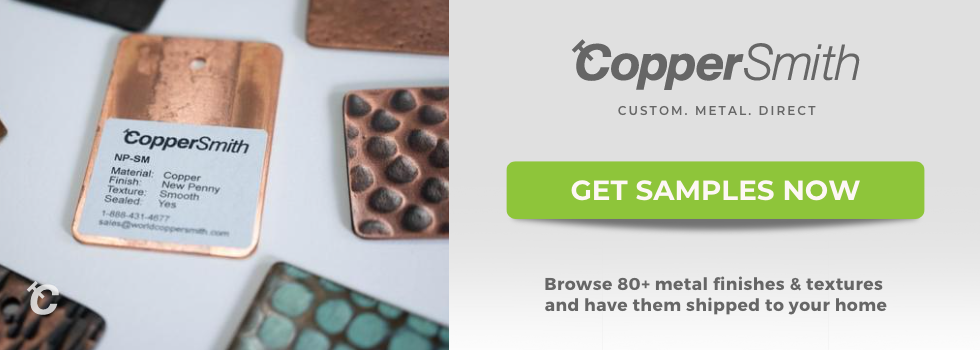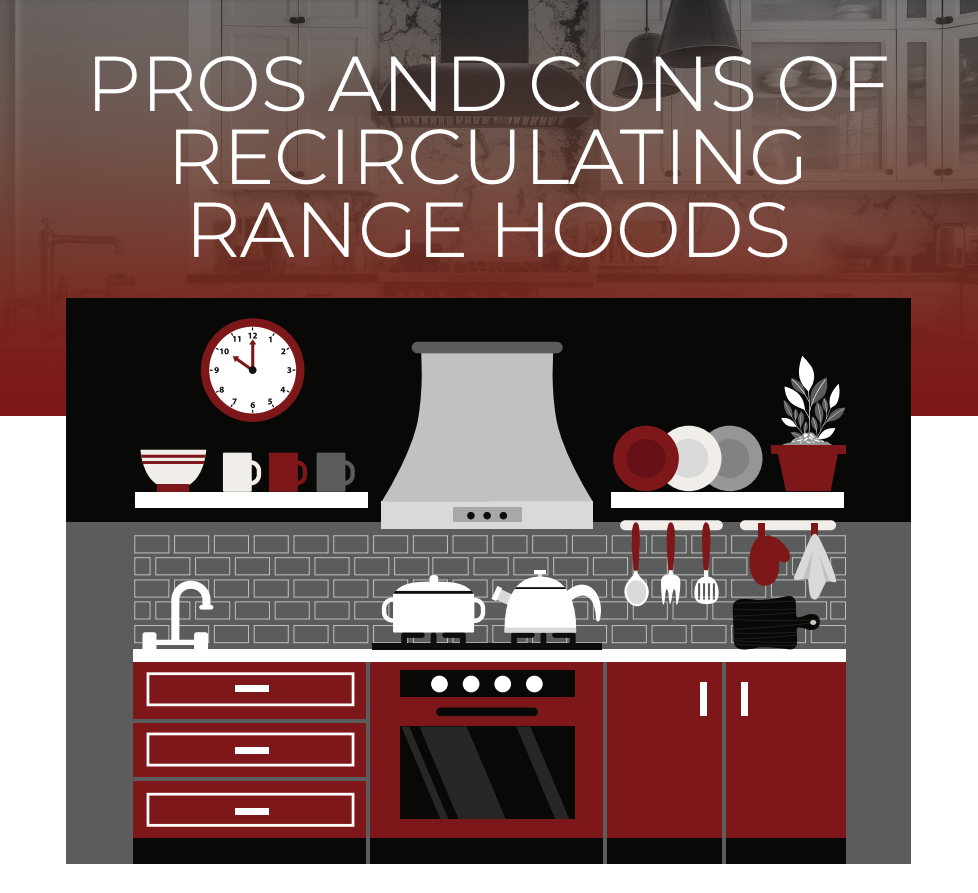
What Is A Recirculating Range Hood?
When it comes to categorizing a recirculating range hood, it is important to know the primary types of range hoods to begin. Range hoods are divided into ducted and ductless systems. A ducted range hood is a system that moves air and unwanted particles, such as airborne grease, out of the kitchen entirely. The other type is ductless range hood, otherwise known as a recirculating range hood. In this type, the system takes out unwanted fumes and odors while simultaneously bringing heat and moisture back into the kitchen. Both systems have advantages and disadvantages to them, and it is essential to know the differences before purchasing one.
How do recirculating hoods work?
Unlike regular ducted range hoods, the air isn’t being sucked outside throuhg a vent - it’s staying in your kitchen. This may call into question, how it actually works. If it’s the same air that’s being sucked through it, what’s the point? Is it even cleaner? Where does the grease and odor go when it’s passing through the range hood?
On the inside of the range hood, there’s a filter that the air has to pass through. The fans have to work harder to pass the air through the filter, but the air comes out perfectly clean on the other side. On one hand, this is less efficient overall, but it can make the air quality of your kitchen much better overall - as it’s not just sucking in the air that’s around your oven.
The filter it uses is charcoal, which does a great job at trapping grease and odors - which may not be as efficient as venting it directly outside, however, it does work effectively. These filters aren’t permanent, and will have to be replaced at some point - however, they should last you quite a long period of time.
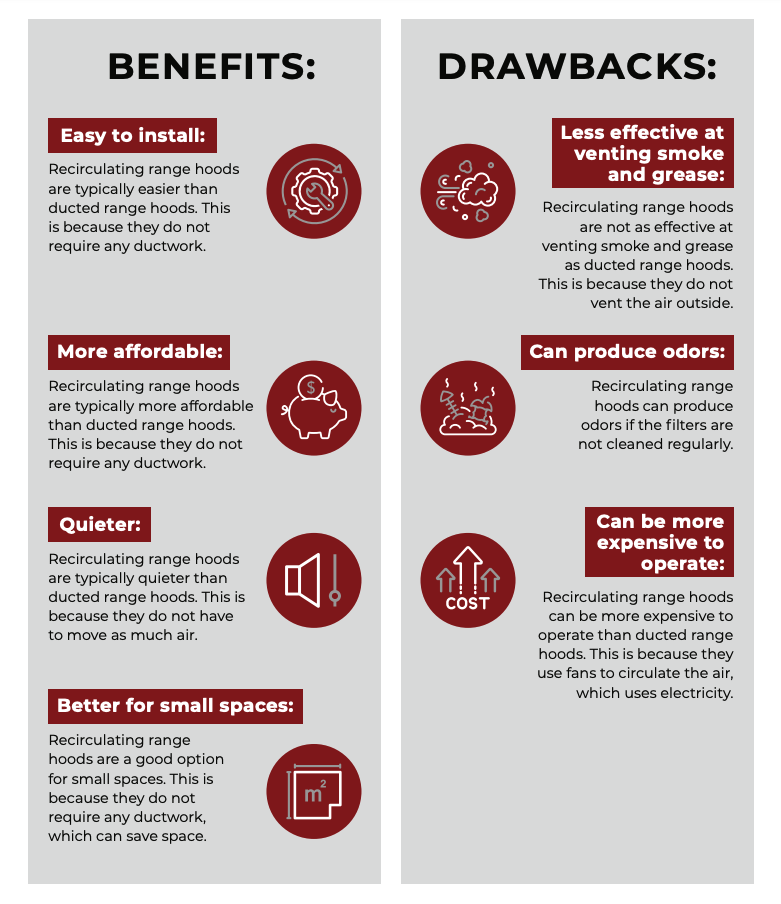
Pro - Efficiency
The first pro of ducted range hoods is its efficiency. Commercial kitchens generally utilize this system because it does not recirculate anything back into the kitchen. Considering that commercial kitchens use the space for making food for more extended periods, it makes sense that a ductless system would cause the kitchen to overheat rather quickly. Though debated among users, another pro of a ducted system is that it generally produces less noise than a ducted system. This may also be influenced by the size and model of the range hood and how well it is maintained.
Con - Installation
One of the disadvantages of having a ducted range hood pertains to its installation. This system requires a set up that goes from the inside of the kitchen to the exterior of the home or building. This reduces the number of locations it can be placed, thereby making installation more particular and costly.
Pro - Mobility
Though the external nature of a ducted range hood limits the places it can go, the opposite is true for ductless range hoods (recirculating range hoods). The system's mobility allows for installation to occur absolutely anywhere. Also, some ductless range hoods can shut off automatically when finished using it. This convenience saves time and reduces the worry of wasting energy.
Pro - Initially Cheaper
If you’re worried about the costs of paying for a range hood right now, or you’re trying to save, then this is a cheaper installation. You’re not going to have to have a duct installed into your wall to vent the air outside, as it’s going to be recirculated into your kitchen air anyway. While you’ll have to pay for filters down the line, if you’re initially looking to save money on the installation, then a recirculating range hood is cheaper. For a lot of people, this tends to be an appealing benefit, as kitchen redesigns are often expensive, and it’s a great way to save money without having to cut out something that you want.
Con – Recirculation Design
Ductless range hoods also come with their own disadvantages. One of which boils down to its recirculating design. Because this system sends heat and moisture back into the kitchen, this can obviously lead to increased humidity. In addition, they may also be slightly louder than a ducted system. The fan usually requires more power, which may increase the average number of decibels, but again, this may have more to do with other factors. Regular cleanings for ductless hood ranges are essential. This also means that maintenance can, of course, become more costly.
Con - Noise
As a ductless range hood is recirclulating the air back into the kitchen through the filters, it actually tends to be a bit noisier. Duct range hoods are transferring the air straight from the kitchen, through a duct, and wherever the duct leads to - but recirculating range hoods are not as simple. While the filters can be effective at recycling the air, it requires more power to get the air through them and back out into the kitchen.
Con - Can be more expensive
You might think the idea of a cheaper installation is much better and affordable, which may be true at first - however, recirclulating range hoods can work out to be more expensive. As the filters used to recirculate the air aren’t going to last forever, you’ll have to replace them as they wear out. That can vary based on how much you use them, so the cost of use will differ for everyone who uses it - however, you’ll likely need to replace them up to twice per year if you’re getting a lot of usage out of it.
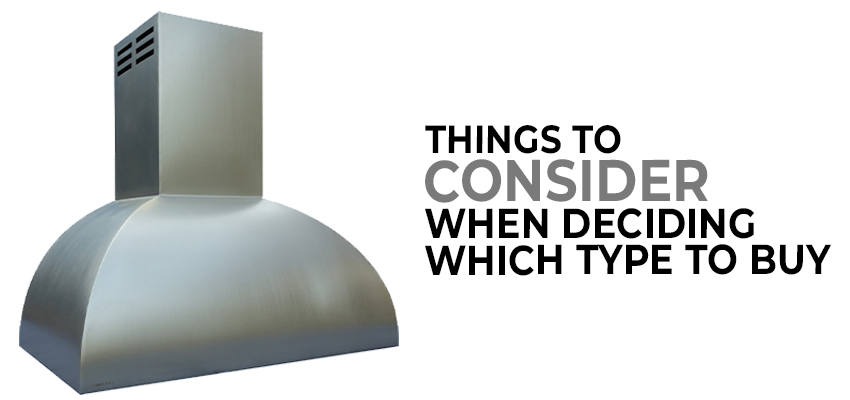
Select a company that understands installation
As you can see, both types of range hoods come with their advantages as well as disadvantages. Deciding which one is right for you can seem very overwhelming. Before going out and buying one, consider a couple of questions that will help solidify that choice. First of all, why are you buying a range hood? Is this for your home or your business? A ductless range hood probably works better in a household considering its mobility and easier installation. That being said, make sure that you schedule cleaning; otherwise, the system will stop functioning the way it's supposed to. If you are considering a range hood for your business, a ductless range hood may be better. Because the kitchen needs to be getting rid of large quantities of unwanted particles, though the installation process will have to be more particular, it will be worth investing in a system that eliminates everything. Another consideration is cost. If you are deciding to install a range hood, it's going to cost something. But make sure that you're not paying too much for what you need. Installation of a ducted system will likely cost more, but in the long run, you won't have to worry about the kitchen getting too humid. On the other side of that, a ductless system will generally cost less, and you also aren't producing nearly as much food. For a house kitchen setting, there's less need to send all particles completely out of the house. Regardless of the choice you make, other factors will affect the quality of your ideal range hood.
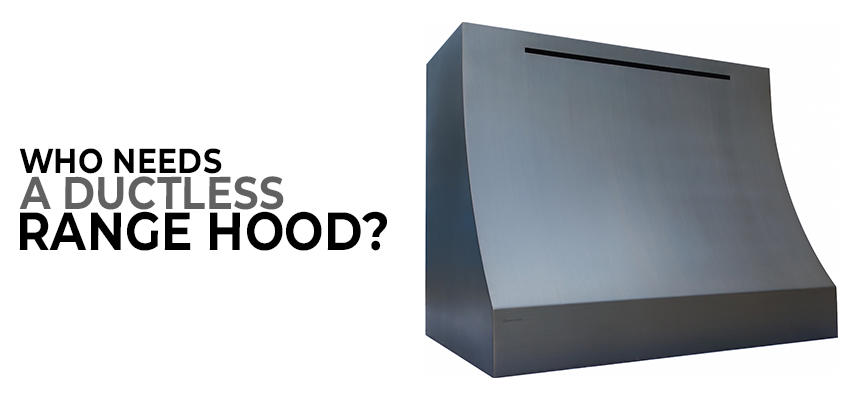
You can customize your range hood experience
Like most enthusiastic homeowners, the creative freedom that comes along with designing a space is unmatched. From artisanal woodwork, appliances with cutting edge technology, to a simple, quaint dining room, homes across the world serve as a blank canvas through which impeccable interior design can spring to life. In the realm of kitchens, these desires are often magnified, as this common space is put to good use, feeding families, harboring growth, culinary inspirations, and entertainment of all sorts. While an aesthetically sound kitchen is no easy feat, it's also incredibly important to make sure that longevity, breathability, and safety are the top priority. This is where the infamous range hood enters the spotlight.
A range hood, also referred to as a vent hood, is an appliance whose primary purpose is to extract excess steam, grease, dust, and odors caused by cooking/baking, ventilating these byproducts through a piping system and expelling them into the outside air. Additionally, these kitchen powerhouses will keep clean up to a minimum, eliminating particles that eventually build up and create a grimy residue on expensive surfaces, detracting from their value and causing more work down the road. Depending on the necessities of the homeowner, range hoods are available in many shapes, sizes, and speeds. In this article, we'll dive into the category of ductless range hoods--their overview, function, notable features, and who needs them.
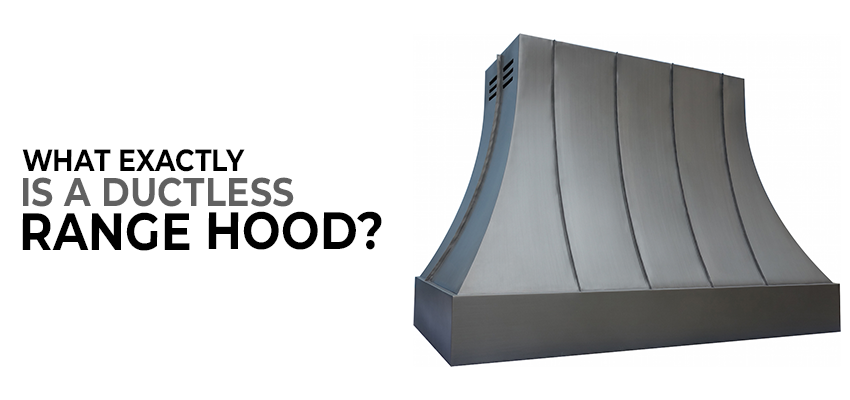
Everybody needs clean air in their home
As stated previously, a range hood swiftly removes unwanted kitchen byproducts and maintains a breathable, environmentally friendly space for the homeowner and their family. Range hoods typically contain a duct ('ducted'), which means that they ventilate air to the outside. In contrast, a ductless range hood lacks this property, utilizing its fan and charcoal filter to suck up, filter and recirculate these particles back into the air inside the home. One of the primary benefits of this model is emphasized in its name: 'ductless.' A traditional range hood must be installed where ductwork is present and able to push air outside; however, ductless range hoods are far more versatile in this regard; they can be installed anywhere in the kitchen and do not require wall plumbing. Furthermore, ductless range hoods stand at an attractive price point. Cheaper models range anywhere from $40 and customized, expensive hoods often exceed $1,000, yet this enticing price tag does come with a few caveats.
Since ductless range hoods contain a charcoal filter, steam, grease, and dirty air accumulate and quickly builds up in its interior, which means that the homeowner will periodically need to take apart the machine and thoroughly clean the filter. In conjunction with a charcoal filter, ductless range hoods can pose a health hazard if not regularly maintained. However, the air is filtered, and it is recirculated back into the kitchen environment. It needs to be cleaned frequently because dirty ductless range hoods can contaminate the space, damage the hood's inner workings, and utilize excess fan energy to continue at optimum performance.
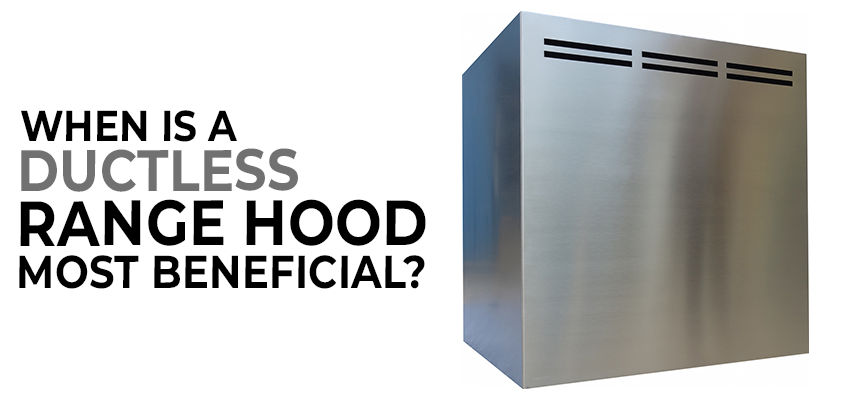
Upon evaluating its features, one may question if a ductless range hood is an appropriate addition to their kitchen. With spacious square footage and an abundance of cabinet space, ducted range hoods are often installed in commercial kitchen settings, as the volume of cooking is much higher. However, ductless range hoods also find their place in this environment, as larger interior spaces are not as easily overwhelmed with excess fumes and can settle more quickly before more is produced. Ductless range hoods are not an ideal option for small, compact kitchens frequently found in apartments and condos. They will not only be able to keep up with the amount of recirculated air, but they will also cause damage to the hood and cause a hefty filter cleaning schedule. It will also put unnecessary stress on the motor, which will cost the homeowner more money in the future.
How effective are recirculating range hoods?
With the additional cost of filters, and the fact that it’s recycling the air, you might be a little skeptical over how effective they can be. It’s the same air after all, and it’s surely not going to work as effectively as a ducted range hood. Well, you might be surprised to know that these range hoods work just fine! You may not even notice a difference in effectiveness between this and a ducted range hood.
That’s not to say they’re without flaw, as you can see there are cons to using a recirculating range hood. It comes down to the preference of the user, as some may prefer ducted, because it’s less maintenance and you can be sure that the air is being ejected outside - rather than having to remember to replace the filter, and possibly risking some downtime in usage if you haven’t got anything to replace the filter with.
Planning your range hood installation
If you’re having trouble visualizing where you want your range hood to be installed, it can be quite troublesome. It’s not easy to picture it all without having some kind of visual representation. Using the 3-D Configurator, you can easily plan out how you want your kitchen to be, with no risk of getting things mixed up in your mind.
